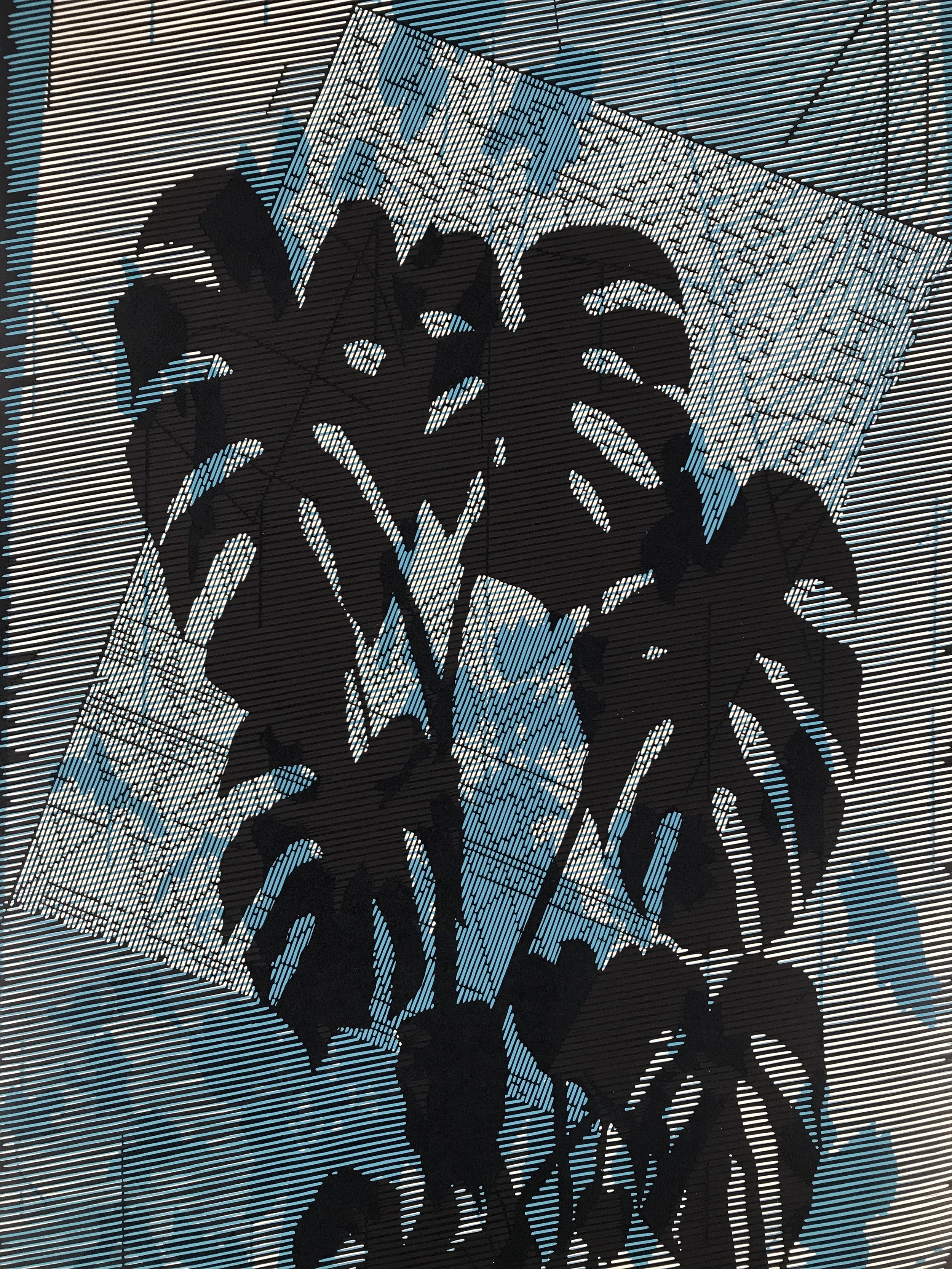
Bevan de Wet | New Territories I | etching with chine-collé | 111x107cm

Bevan de Wet | New Territories II | etching with chine-collé | 111x107cm

Bevan de Wet | Plant Study I (Lily) | 5 layer screenprint | 42x59,4cm

Bevan de Wet | Plant Study II (Succulent) | 5 layer screenprint | 42x59,4cm

Bevan de Wet | Plant Study III (Ficus) | 5 layer screenprint | 42x59,4cm

Bevan de Wet | Untitled (Plant Study X) | watercolour on handmade paper | 75x56cm

Bevan de Wet | Untitled I | watercolour monotype | 75x56cm

Bevan de Wet | Untitled II | watercolour monotype | 75x56cm

Bevan de Wet | Untitled (Plant Study Y) | watercolour on washi with monoprint backing | 75x56cm

Bevan de Wet | Untitled VII | watercolour monotype | 75x56cm

Bevan de Wet | Untitled VIII | watercolour monotype | 75x56cm

Bevan de Wet | Continental Shift I | etching with chine-collé | 44,8x36cm

Bevan de Wet | Continental Shift II | etching with chine-collé | 44,8x36cm

Bevan de Wet | Continental Shift III | etching with chine-collé | 44,8x36cm

Bevan de Wet | Continental Shift IV | etching with chine-collé | 44,8x36cm

Bevan de Wet | Continental Shift V | etching with chine-collé | 36x44,8cm

Bevan de Wet | Continental Shift VI | etching with chine-collé | 36x44,8cm

Bevan de Wet | Continental Shift Studies I | etchings hinged to backing | 50x65cm

Bevan de Wet | Continental Shift Studies II | etchings hinged to backing | 50x65cm

Bevan de Wet | Continental Shift Studies III | etchings hinged to backing | 50x65cm

Bevan de Wet | Continental Shift (Colour Study) | watercolour crayon | 50x65cm

Bevan de Wet | Dinosaur Food (Gunnera Manicata) | etching | 49,3x43,3cm

Bevan de Wet | This is not a man, its a Tree I | ink on paper | 140x66,5cm

Bevan de Wet | This is not a man, its a Tree II | ink on paper | 140x66,5cm

Bevan de Wet | This is not a man, its a Tree III | ink on paper | 140x66,5cm

Bevan de Wet | Mirage I | linocut | 178x88cm

Bevan de Wet | Mirage II | linocut | 178x88cm

Bevan de Wet | Mirage III | linocut | 178x88cm

Bevan de Wet | Rock Study (Melting Ice) | Cyanotype, van Dyk brown and ink | 62x99,4cm

Bevan de Wet | Rock Study | van Dyk brown and ink | 78,5x99cm

Bevan de Wet | Leaf Panel I&II | ink on handmade paper collage | 160x122cm

Bevan de Wet | Shimmer | watercolour monotype | 75x56cm

Bevan de Wet | Mirage I (detail) | linocut | 178x88cm
Distant Relatives, White River Gallery, 2020
“This is not a man, its a tree,
And I’m a bird, and I’m gone.”
In a time when we seem so globally interconnected, we are showing ourselves to be less inclusive and tolerant than ever. The global population is at its peak, and our consumption and demand are at an all time high. Feeding this need for consumption, our planet is facing catastrophic environmental and ecological strain. We have distanced ourselves from our ancestral values and become estranged from our natural environments. Distant Relatives explores man’s growing sense of alienation from nature, rendering it a near forgotten and abstracted space, particularly in overdeveloped and densely populated urban environments.
De Wet’s etchings, relief prints, drawings and handmade paper works range from figurative forms of foliage and flora to microscopic planes, textures and geographical spaces.
The artist’s garden becomes a site of inspiration for his imagery, often photographed and put through digital filters before referencing. The digital manipulation of these images generates new abstracted landscapes that are unfamiliar and somewhat dystopian. The process examines the tensions between the natural, organic forms of nature and the structures we impose on them. Images are dissected and collapsed into singular but complex platforms.
This body of work explores what de Wet refers to as “…a new way of mapping our immediate spaces. By using fragments of plants and natural elements, I am challenging traditional depictions of landscape [art] in South Africa.”
Since mapping has a history of colonialism, and of plotting “unchartered” space, this practice of construction and deconstruction attempts to reverse and re-imagine, in a sense unoccupying space. Working with a combination of structure and chance, it allows for a vulnerable space that evokes a sense of uncertainty and otherworldliness. “By embracing chance, I aim to highlight the ephemeral cycle of creation and disintegration. This practice becomes an allegory for the breakdown of our ancestral values, and the fragmented nature of our engagement with space and our connection to the world.”
The plant and nature elements in de Wet’s work are symbolic of what we are overlooking and neglecting. Distancing ourselves from nature, our perceptions of it are distorted and idyllicised through digital interfaces. With environmental concerns around drought and deforestation, uncontrollable fires and the perpetual expansion of cities, de Wet is fascinated by the scars that are left on the landscape as a record of its history and trauma.